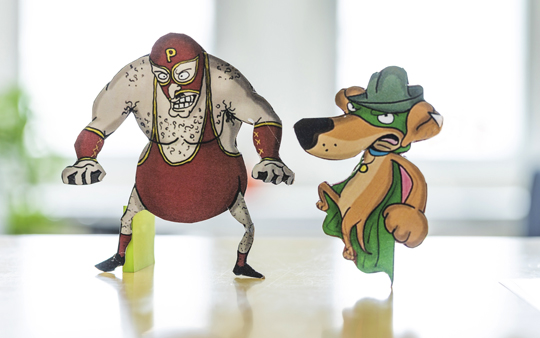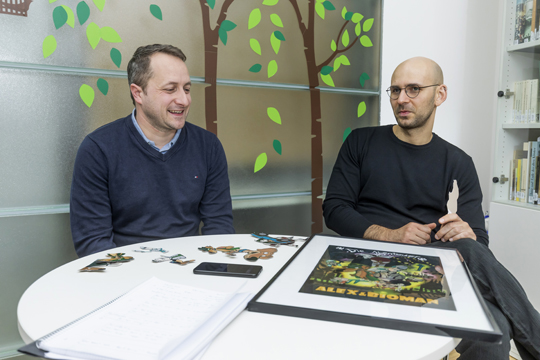The Sausage Dog Saving the World
Freiburg, Mar 25, 2020
The fight for a better world is an eternal motif in comics. In “Die Abenteuer von Alex & Bioman” [The Adventures of Alex & Bioman], forester Alex, a dachshund, and superhero Bioman want to solve the world’s energy crisis. The comic won Dr. Alex Giurca from the Chair of Forest and Environmental Policy and Dr. Markus Herbener from the Chair of Forest History at the University of Freiburg the “Science Year 2020” university competition. In interview with Patrick Siegert they explained their project and the role that the concept of bioeconomy plays in it.

The evil Petrolius and dachshund Alex fight over the future of the planet. Photo: Jürgen Gocke
Mr Giurca, Mr Herbener, how did you come up with the idea of The Adventures of Alex & Bioman?
Alex Giurca: Two years ago I participated in an art competition on bioeconomy with one of my drawings and took one of the three prizes. “The Bioeconomy Arena” introduced almost all the characters who appear in “Alex and Bioman”, apart from dachshund Alex. After the competition I started to write background stories for the characters, partly based on my dissertation on networks and conflicts between the stakeholders in the forest-based bioeconomy. I already knew that Markus is an enthusiastic comic book collector.
Markus Herbener: And I realized that Alex is great at drawing. After we got talking about his comics we decided to work on a book together. We developed the story further together: he did the drawings and I wrote the dialogues. I’ve long dreamed of creating a comic myself. And I thought it was great that it dealt with bioeconomy, which I’m very involved with professionally.
What does bioeconomy mean?
Alex Giurca: Bioeconomy is a new discourse that is still unfamiliar to the public. We define it as an economy that is based on renewable resources instead of fossil-based ones. So it involves energy and materials such as clothing, bio-based fibers and chemicals. For instance, the forest isn’t just biomass that we can make something from, it is above all an important ecosystem that we have to preserve. We’ve known this for a long time in science. But to make this complex subject accessible to everyone, we’re trying to communicate it more simply. So the “Science Year 2020: Bioeconomy” university competition was perfectly timed for us. As a member of the “Bioeconomy in Baden-Württemberg” research program, the Faculty of Environment and Natural Resources has been working on the subject for a long time.
Markus Herbener: From a sustainability point of view, a resource like wood should only be used as much as it can regenerate. The problem is that such resources are overused in energy crises. For me, bioeconomy is the future. We’re not just doing the project for fun, we’re looking at a crucial question: how can we move away from fossil fuels? If you put aside the humor, our comic really looks at a serious subject.
If you ignore the superpowers– how realistic is the story you present in the comic?
Alex Giurca: The story starts innocently. But it becomes gradually darker, like a storm about to break. Forester Uwe, his wife Helga and dachshund Alex live in a picturesque village in the Black Forest. But then this idyll clashes with the world of fossil-fuel magnate Petrolius. We want the comic to show that this idyll is fragile. We’re all part of a globalized world: decisions taken far away have a direct influence on our own lives.
Markus Herbener: There are numerous demands on the forest. It’s almost impossible for forest managers to share the resources fairly. And on top of that they constantly have to cope with problems such as climate change, forest fires, plagues of insects and areas of social conflict. As a resource, wood is not just used for paper or furniture, but also for biotechnology and innovation. Forest managers have to be open to new areas and take part in the entire process. If they don’t, others will decide what happens with the resources. Bioeconomy can and must in any case only operate sustainably.

Markus Herbener (left) and Alex Giurca are breaking new ground: they want to introduce the general public to their research through their comic. Photo: Jürgen Gocke
Where can people read the comic and what else do you have planned?
Alex Giurca: We published the first pages on our website a week ago. A new page will appear each Friday. And we send out information about updates and events in a newsletter. For instance, we’re planning an event with lectures by experts where you can get a free print edition of the comic. And there’s also going to be a talk on humor in science.
Markus Herbener: We want to promote the fact that you can also do serious scientific work in academia with humor and creativity. Whether it’s in the forest or at a scientific conference: dachshund Alex will be posting regularly on Instagram, where you can find him at the moment. On Facebook he explains bioeconomy-related issues from his everyday life to a wide audience.
What can a comic do that other ways of conveying ideas can’t?
Markus Herbener: In school they made languages come alive to us through reading things like Asterix and Obelix in Latin. Back in the Middle Ages people were already depicting ideas and relationships, as you can see from the stained glass windows in Freiburg Minster. Visualization can help to reach even those people who don’t enjoy reading so much.
Alex Giurca: After my PhD I started to work using artistic means rather than simply informative ones. This felt extremely liberating. Comics are a creative way of sharing knowledge. In times of Twitter and other social media they can be an important way of packaging content in a compact and humorous way.
So what happens next with the project?
Alex Giurca: As participants in the Science Year 2020 we couldn’t work with a publisher, because that would generate income. With a budget of 5,000 euros we will first of all print a couple of thousand copies. Next year we might release the comic in a larger run, if possible. We don’t know yet how the book will be received – but I’m happy that we’ve tried something new.
Markus Herbener: In the end the story of Alex and Bioman remains open. It’s a bit like Goscinny and Uderzo, the creators of Asterix and Obelix, for us: a team like that only functions in the long run if they get on well together and laugh together. It’s the same with this comic project.

